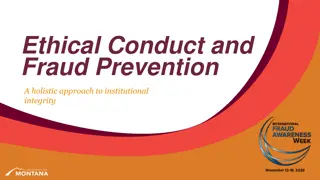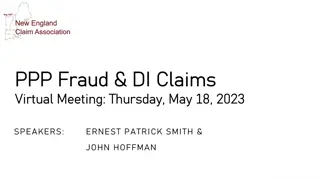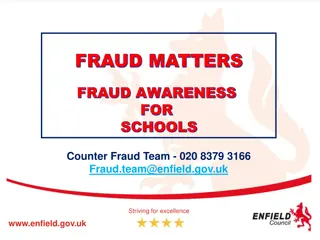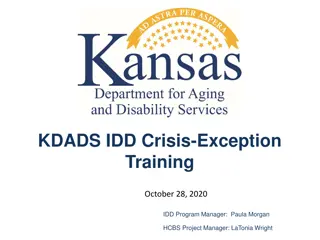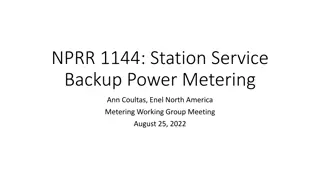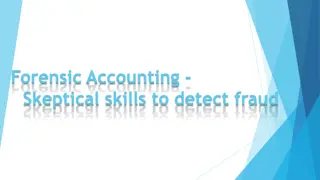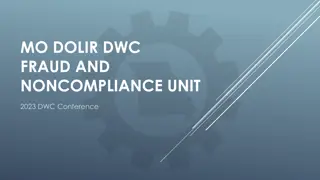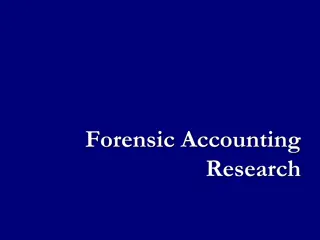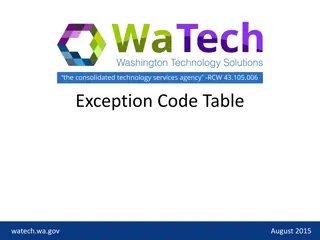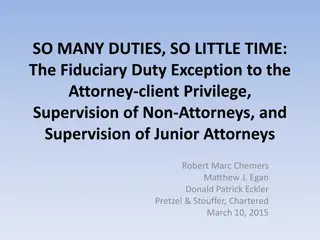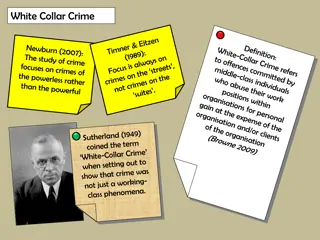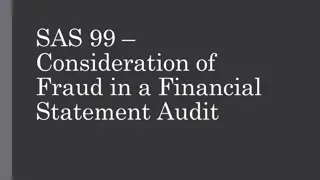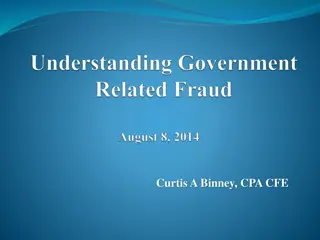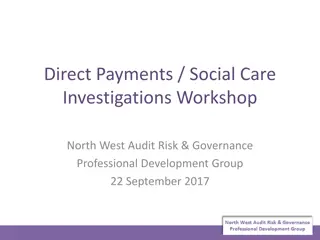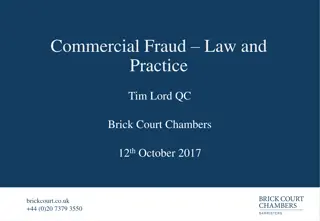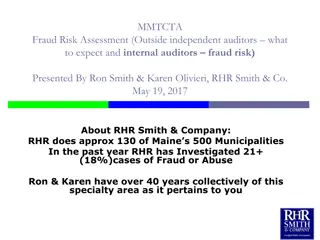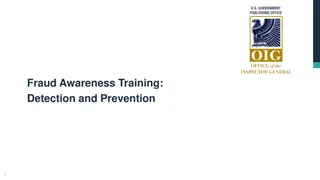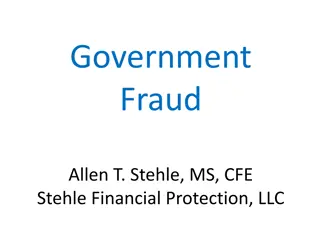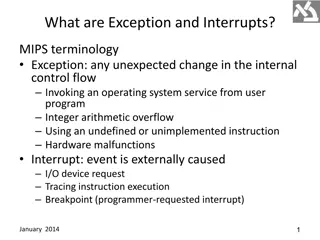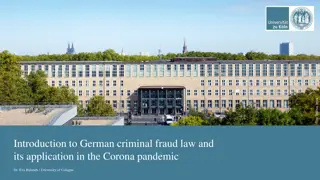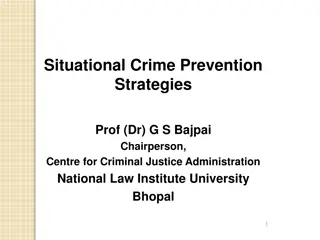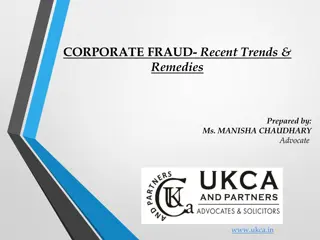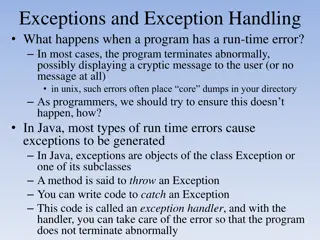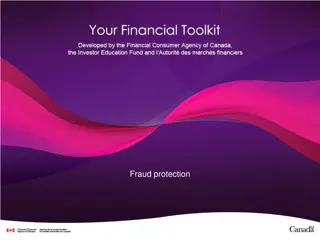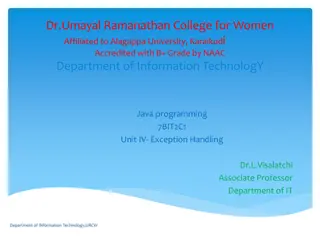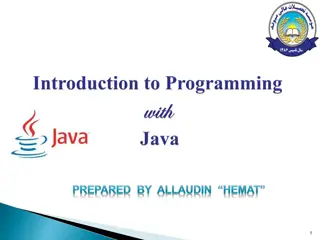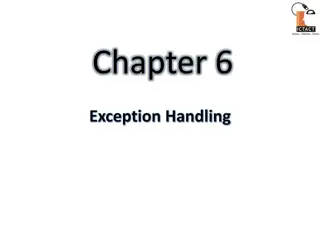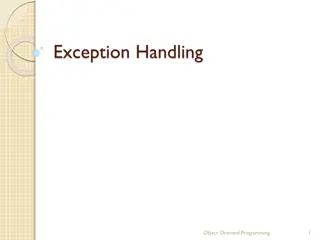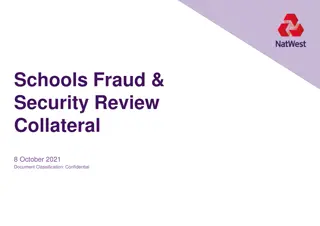Efficient Fraud Management with Data Analytics
Learn the importance of data analytics in fraud management and how it can streamline risk assessment, prevention, detection, audit planning, and investigation processes. Discover key areas where data analytics can make a difference and avoid common mistakes in your fraud analytics plan. Embrace data
2 views • 33 slides
Understanding Grant Fraud: Insights from DOJ Office of the Inspector General
Explore the world of grant fraud awareness with insights from Special Agent Jason P. LeBeau of the United States Department of Justice Office of the Inspector General. Learn about the investigation of fraud, waste, and abuse in various sectors like bank fraud, money laundering, tax evasion, and more
2 views • 27 slides
2023 WV ASBO Conference
Dive into the world of ethics and fraud in education with Dr. Scott Fleming as he discusses the importance of instilling proper values to promote ethical behavior, the factors influencing trust violations, characteristics of fraud actions, and the evolution of fraud theory. Gain valuable insights in
0 views • 96 slides
Exploring the Implementation of CPTED Strategies in Crime Prevention
Understanding CPTED (Crime Prevention Through Environmental Design) and its application is crucial for reducing crime and improving quality of life. This approach involves designing and using the built environment effectively to create safer communities. The delivery of CPTED involves collaboration
6 views • 21 slides
Understanding Ethical Conduct and Fraud Prevention in Institutions
Explore the nuances between ethics and fraud, famous fraud cases like Enron and Bernard L. Madoff Investment Securities LLC, and learn how to detect and prevent fraudulent activities within institutions. Recognize the importance of ethical behavior, early detection, and fraud prevention measures to
9 views • 36 slides
Understanding the Escalating Threat of Fraud in Financial Transactions
Rebekah Higgins, Vice President of Payments, delves into the alarming rise of fraud in financial transactions, revealing staggering statistics, emerging threats, and the critical need for prevention tools. The presentation covers fraud trends, common types of fraud, transaction flow, and the key pla
3 views • 30 slides
Understanding Fraud in Financial Claims: Insights from Experts
Delve into the world of fraud and insurance claims with insights from renowned experts Ernest Patrick Smith and John Hoffman. Learn about the key elements of fraud, common definitions, and the intricacies of proving fraud, particularly in the challenging landscape of the California Department of Ins
0 views • 29 slides
Enhancing Fraud Awareness in Schools
Fraud Matters is a comprehensive program focused on increasing fraud awareness in schools. The initiative aims to educate staff, students, and stakeholders about the risks of fraud, preventive measures, and the detrimental impacts of fraudulent activities. By understanding what constitutes fraud and
1 views • 38 slides
KDADS IDD Crisis Exception Training Overview
This document provides an overview of the KDADS IDD Crisis Exception Training held on October 28, 2020. It includes information on the agenda, purpose of the training, review of the current process, and policies related to crisis exceptions in IDD programs. The training aimed to streamline the crisi
1 views • 16 slides
Challenges to Enforcement in Arbitration: Immunity, Fraud, and Public Policy
Session 3 of the Arbitration Mini Series on May 25th discusses challenges to enforcement in arbitration, including issues related to immunity, fraud, and public policy. Topics such as extensions of time in fraud challenges, the 1996 Arbitration Act, the Kalmneft factors, and fraud cases in arbitrati
0 views • 20 slides
Proposal NPRR.1144: Station Backup Power Requirements Exception
NPRR.1144 proposes an exception allowing up to 500kW of auxiliary load to connect to a Transmission/Distribution Service Provider's facilities through a separately metered point using an emergency load transfer switch. This exception aims to provide flexibility in redundant power supply options for
0 views • 4 slides
Crime in Scotland Quiz: Test Your Knowledge about Crime Statistics
Explore a engaging quiz featuring questions related to crime in Scotland, covering topics such as surveys, crime rates, property crime, violent crime, police views, public perceptions, and more. From the Edinburgh Study of Youth Transitions & Crime to data on adults' experiences and perceptions, thi
2 views • 4 slides
Understanding Fraud and Forensic Accounting
Fraud is defined as deception to gain an unlawful advantage. Various legal definitions of fraud under Indian law are discussed, including those under the Indian Penal Code, Indian Contract Act, and Companies Act. The concept of forensic accounting in detecting and investigating fraud is also introdu
0 views • 15 slides
Missouri Department of Labor and Industrial Relations (DOLIR) Fraud and Noncompliance Unit Overview
The Missouri DOLIR Fraud and Noncompliance Unit (FNU) was established in 1993 by the General Assembly to investigate fraud and noncompliance related to Chapter 287 RSMo (Workers' Compensation Law). The FNU is dedicated to promoting a safe work environment by upholding the integrity of Missouri's Wor
0 views • 35 slides
Understanding Forensic Accounting and Fraud - Types and Definitions
Forensic accounting plays a crucial role in detecting and investigating various types of fraud such as financial reporting fraud, asset misappropriation, and employee embezzlement. Fraud is defined as intentional deception resulting in a loss and involves misrepresentation of material facts. Types o
0 views • 19 slides
Exception Code Table - Overview and Navigation
Learn about the Exception Code Table on Watech.wa.gov created for processing various types of payments. Discover the reasons behind its creation and how to navigate to access the codes. Explore the available Exception Codes and their structures in this informative guide.
0 views • 24 slides
Crime Statistics and Severity Analysis: RCMP Sooke Detachment
An overview of crime severity measurements, property crime rates, and violent crime rates in Sooke and comparable detachments. The data includes crime severity index scores, crime type contributions by year, and property/violent crime rates per 1000 population. The analysis shows changes over time,
0 views • 8 slides
Understanding the Fiduciary Duty Exception to Attorney-Client Privilege
Several courts have deliberated on extending attorney-client privilege to protect communications between law firms' in-house counsel seeking advice on handling potential malpractice claims. This exception, known as the fiduciary duty exception, has faced scrutiny and rejection in recent cases, safeg
0 views • 36 slides
Understanding White Collar Crime and Occupational Crime
White collar crime encompasses various offenses such as fraud, embezzlement, forgery, collusion, and tax evasion. This type of crime can often go undetected due to its complex nature and the difficulty in investigating it. Occupational crime, on the other hand, involves employees stealing from their
0 views • 7 slides
Understanding SAS 99 and Fraud Consideration in Financial Audits
This presentation delves into SAS 99, highlighting the importance of considering fraud in financial statement audits. It explains the impact of SAS 99 on auditors, emphasizes management's role in preventing and detecting fraud, and discusses the Fraud Triangle and types of fraud addressed by SAS 99.
1 views • 41 slides
Understanding Fraud in Auditing and Government
Fraud encompasses multifarious means of deception for personal gain and can significantly impact financial statements. Government fraud involves intentional acts to deceive, resulting in substantial losses annually. Auditors must diligently identify and address fraud risks to ensure the accuracy and
3 views • 68 slides
Understanding Crime and Deviance: Control, Solutions, and Measurement
Exploring the concepts of crime and deviance, this content delves into various aspects such as types of deviance, agents of social control, solutions to crime, the penal system, methods of punishment, and measurement of crime through victim surveys and self-reported studies. It highlights the comple
0 views • 43 slides
Addressing Rural Crime in Agriculture: Challenges and Solutions
The presentation highlights the global issue of crime in farming communities, discussing manifestations of crime rates, characteristics of farmers in dealing with crime, features of rural environments, and approaches to combating crime. It sheds light on various crimes affecting agriculture such as
0 views • 10 slides
Direct Payments & Social Care Investigations Workshop Overview
Explore the key areas covered in the Direct Payments & Social Care Investigations Workshop, focusing on Direct Payments, social care fraud, applications, counter-fraud work, investigations, and overcoming cultural resistance. Delve into the risks associated with social care fraud and learn about the
0 views • 28 slides
Strategies for Handling Commercial Fraud Cases: Insights from Brick Court Chambers
Dive into the world of commercial fraud law and practice with key advice from Tim Lord QC of Brick Court Chambers. Explore topics such as disclosure issues, guiding principles, the importance of the 1st CMC, and expert tips for advising claimants in fraud cases. Learn how to navigate the complexitie
0 views • 54 slides
Fraud Risk Assessment and Internal Controls Overview
This presentation by Ron Smith & Karen Olivieri from RHR Smith & Co discusses fraud risk assessment, the definition of fraud, types of fraud, fraudster statistics, and the importance of internal controls in preventing and detecting fraud. They also delve into the responsibilities of auditors in prov
0 views • 42 slides
Fraud Awareness Training: Detection and Prevention
This comprehensive fraud awareness training covers the detection and prevention of fraud, including an overview of the Office of Inspector General, common types of fraud, red flags for detection, examples of cases, fraud prevention strategies, and reporting mechanisms. It delves into the elements of
0 views • 20 slides
Understanding Government Fraud: Impacts and Prevention
Government fraud is a serious issue that impacts public trust and financial stability. This type of fraud involves intentional acts to deceive the government and can occur internally or externally. The public perception of government organizations is affected by fraud, and entities such as the U.S.
1 views • 50 slides
Exception Handling and Interrupts in MIPS Architectures
Exception and interrupts in MIPS play a crucial role in handling unexpected events and external requests efficiently. Exceptions include changes in control flow, arithmetic overflows, and hardware malfunctions, while interrupts are externally caused events like I/O requests. When an exception occurs
1 views • 29 slides
Understanding German Criminal Fraud Law in the Context of the Corona Pandemic
Explore the intricacies of German criminal fraud law, particularly in the current Corona pandemic situation. Delve into the objective and subjective elements of the offense, characteristics of fraud, and subsidy fraud, along with detailed discussions on deception, error, disposition of property, and
0 views • 17 slides
Understanding Situational Crime Prevention Strategies
Situational crime prevention strategies aim to reduce crime by altering environmental conditions, influencing offender decisions, and targeting crime opportunities. Primary prevention focuses on modifying physical and social environments, while secondary prevention aims to identify potential offende
1 views • 31 slides
Understanding Corporate Fraud in India: Recent Trends & Remedies
Corporate fraud in India has had a significant impact on the economy and businesses in recent years. This article explores the meaning, definition, and penalties associated with corporate fraud under the Companies Act, 2013. It discusses various fraud cases in India and the consequences for those fo
0 views • 29 slides
Understanding Java Exception Handling
Java provides a way to handle run-time errors through exceptions, which are objects of the class Exception or its subclasses. By using exception handlers, programmers can catch and manage exceptions to prevent abnormal termination of the program. Java's exception hierarchy includes Throwable, which
0 views • 29 slides
Fraud Protection and Awareness Workshop
Join us for a comprehensive workshop on fraud protection and awareness. Learn about common fraud schemes, how to identify warning signs, protect your finances, and what to do if you fall victim to fraud. Engage in interactive quizzes to test your knowledge and stay informed. Let's work together to p
0 views • 26 slides
Exception Handling in Java: Basics, Examples, and Importance
Understanding the concept of exception handling in Java, including what exceptions are, the difference between errors and exceptions, reasons for exceptions, how to handle them, and the advantages of exception handling. This topic covers the basics of handling runtime errors in Java programming and
0 views • 27 slides
Understanding Exception Handling in Java
Exception handling in Java is a crucial mechanism to manage runtime errors effectively. This article explains the concept of exceptions, advantages of using exception handling, types of exceptions (checked, unchecked, and errors), common scenarios like ArithmeticException and NullPointerException, a
0 views • 23 slides
Exception Handling in Java: Understanding Errors and Exceptions
Exception handling in Java is crucial for dealing with errors and exceptions that can occur during program execution. Errors and exceptions are conditions that disrupt the normal flow of a program, and understanding their differences is key to effective error management. This chapter covers the conc
0 views • 32 slides
Understanding Exception Handling in Object-Oriented Programming
Exception handling in object-oriented programming enables a program to manage and recover from exceptional situations during runtime errors. Java uses exceptions to represent errors, allowing methods to throw exceptions that can be caught and handled by the caller, thus separating error detection an
0 views • 21 slides
Schools Fraud & Security Review Collateral
This document titled "Schools Fraud & Security Review Collateral" discusses various aspects of fraud and security including the latest trends, information on suspicious activities like email scams and investment offers, and provides further help and guidance. It emphasizes the need for vigilance and
0 views • 9 slides
Analysis of Entire Agreement Clause in Fraud Cases
The case of Dannan Realty v. Harris Richard Warner examines the impact of an entire agreement clause on a fraud cause of action. The majority opinion highlights that the specific language of the clause, stating the buyer is not relying on any representations outside the written contract, barred the
0 views • 6 slides




